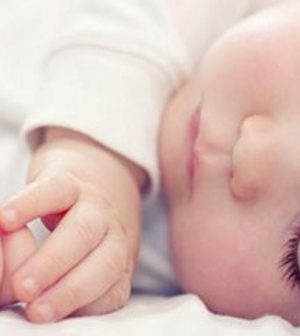- Could Artificial Sweeteners Be Aging the Brain Faster?
- Techniques for Soothing Your Nervous System
- Does the Water in Your House Smell Funny? Here’s Why
- Can a Daily Dose of Apple Cider Vinegar Actually Aid Weight Loss?
- 6 Health Beverages That Can Actually Spike Your Blood Sugar
- Treatment Options for Social Anxiety Disorder
- Understanding the Connection Between Anxiety and Depression
- How Daily Prunes Can Influence Cholesterol and Inflammation
- When to Take B12 for Better Absorption and Energy
- Epsom Salts: Health Benefits and Uses
Kids’ Sleep Suffers When Parents Can’t Afford Diapers

It might seem like an unlikely connection at first, but a new study finds that infants and toddlers suffer sleep issues — and maybe other problems — when their parents can’t afford diapers.
“Sleep promotes brain development and solidifies learning and memory,” noted study co-author Sallie Porter, an associate professor at Rutgers School of Nursing in New Jersey. “Children with compromised sleep are more at risk for childhood obesity and emotional and behavioral problems.”
Porter and her colleagues surveyed 129 parents of children age 3 and younger who were signed up for early development, home visits and disability support programs.
The parents were asked about their diaper needs and their child’s sleeping habits, including how long it takes them to fall asleep, how often they wake at night, the longest stretch they sleep, and the total number of minutes they sleep each night.
Parents were also asked about difficulties with children’s bedtime routines, sleep problems and sleep locations, their child’s quality of sleep, and if their child had been diagnosed with a developmental disability.
Nearly 9 in 10 of the families in the study were food-insecure, 76% had to go without diapers at least once a year, and more than one-third said they did not have diapers monthly.
Children in families that struggled to provide diapers were more likely to have disrupted, shorter sleep periods and lower total sleep scores. Parents who worried about not having enough diapers at least monthly were more likely to describe their child’s sleep as a problem or difficult, according to the study.
“Approximately one-third of U.S. mothers report difficulty affording diapers, and prevalence during the COVID-19 pandemic is likely much higher,” Porter said in a Rutgers news release. “Diaper need is associated with an increased incidence of irritated skin and urinary tract infections. It is also related to increased maternal mental health symptoms.”
The findings suggest the health care providers should ask parents about diaper needs during well-child visits and connect families in need to resources that provide diapering supplies, Porter said.
The findings were published May 2 in the Journal of Developmental Behavioral Pediatrics.
More information
For more on diaper need, go to the National Diaper Bank Network.
SOURCE: Rutgers University, news release, May 3, 2022
Source: HealthDay
Copyright © 2026 HealthDay. All rights reserved.










